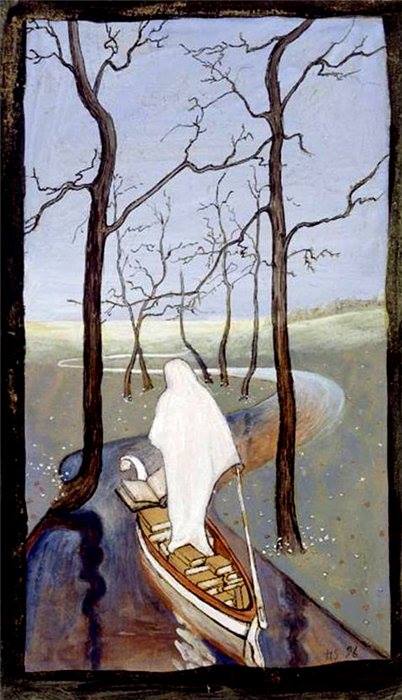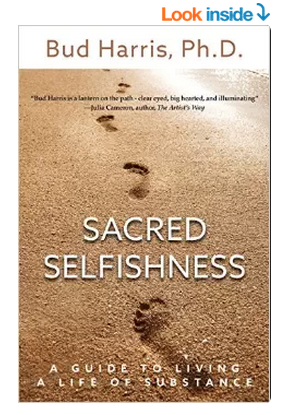
When we paralyze ourselves with self-critical, judgmental attitudes, the life energy that is supposed to be sustaining our growth becomes regressive, stagnant, and deadly. Soon we become bonded to fear, the fear of losing what we have attained or the fear of making our lives more difficult.
Anxiety causes us to develop a mentality of scarcity and to shrink ourselves into cramped versions of our possibilities and into a life too small and too anxiety-ridden to fulfill us. One of our most basic needs is to learn how to quit judging ourselves and to open the door to the cage we have been living in.
In earlier blogs, I have shared excerpts from the section “Befriending Our Needs” from my book Sacred Selfishness: A Guide to Living a Life of Substance. I would now like to share excerpts from the next section in my book: “From Self-Judgment to Self- Acceptance” because it addresses how our self-critical attitudes are primary blocks to our ability to “know” our needs.
From Self-Judgment to Self-Acceptance
Understanding the ways in which we form our adult identities, and how we’re influenced by the values of society and the traits it structures into our personalities, makes it easier to see how self-alienation is built into our existence. It begins as soon as we leave the womb and are launched into a process of being weighed and measured.
Measurement in some form now accompanies almost every aspect of modern life. Ostensibly, measurement is supposed to be for our “own good” to monitor our health, growth, and capacities. Today, as we grow and enter school it tells us how well we’re doing, where we fall on the “growth chart,” whether we have “potential,” and if we’re “living up” to that potential from the perspective of society’s values.
Almost before we realize it the emphasis on measurement is connected to our appearance, our performance, our behavior, and has been internalized into a personal mind-set. As we grow into adulthood everything from our sex lives to our credit ratings is evaluated from this perspective. We’re taught to judge ourselves relentlessly.
The author and physician Naomi Remen observes that our vitality is diminished more by judgment than by disease. She goes on to explain that approval is just as damaging as a form of judgment ascriticism. While positive judgment initially hurts less than criticism, it triggers a constant striving for more. It makes us uncertain of who we are and of our true value.
Approval and disapproval spawn a compulsion to critically evaluate ourselves all the time. For example Judith won’t go out for an evening with her husband and friends without spending an hour and a half putting on makeup. Harry can’t do enough favors for everyone he tries to become friends with. And Matthew remains quiet and shy, preferring to be seen as a loner rather than to risk being rejected.
In a society that thrives on consumerism, we have become increasingly vulnerable. Advertising takes advantage of our obsession with self-judgment and desire for approval while holding out the promise that if we buy the right clothes, use the right makeup, follow the right diet, have the right appliances, yard tools, vacations, and so on, we can become happy and admired.
Even the self-help industry has joined the caravan of marketing with books, tapes, videos, and workshops offering “quick fixes” to what’s wrong with our lives rather than challenging us to look deeper into ourselves. The marketing people are clever and know how to exploit our hopes and fears. Our social engine runs on performance and consumption. But we can face and change ourselves by developing enough self-knowledge to reclaim our lives, take initiative, have a viewpoint, love ourselves, and live in the world without being victimized by it.
After we’d been working together for a few months, Janice was reflecting on how she used to feel standing in front of that magazine rack in the drugstore. It was a pivotal moment for her. She said, “All of those self-improvement articles and advertisements make you feel you aren’t good enough. That you’re incomplete, inferior, inadequate. And what’s supposed to make you feel better? Buying the magazine and buying the products. Now that’s self-empowerment for you. Now that I’ve opened my eyes it seems like our whole culture is geared toward making you hate yourself and believing that buying more is the only thing that can help. It’s like ‘fix it, charge it.’ But all you’re really doing is keeping the system going.”
Janice is right. We’re all born with an inner longing to live a meaningful life, to love and be loved. Advertisers have become skilled at redirecting these longings toward consumer goods, trying to convince us that inner needs can be satisfied with external things. They manipulate our needs to keep us off balance, anxious, and fearful of social isolation and loneliness. It is the modern equivalent of tribal banishment. The system that drives our society promises that life can be good. But if we rely on the values of that system without growing beyond it into our own conscious awareness, all it will deliver is self-alienation.
To know that we are human is to know that life includes loss, darkness, and confusion, as well as magic and beauty. To become a mature, wise person requires that we come to know ourselves deeply and learn to navigate life’s waters skillfully. Our growth depends upon our awareness of the reality we’re experiencing. In turn, as this awareness grows, it will open us to further growth.
Knowing ourselves more fully, learning how to cultivate our inner resources and love ourselves in a substantial manner heals self-alienation and gives a firm foundation for letting the tides of culture flow around us without threatening us. Additionally, as we work on ourselves we must work on our society so that for future generations the term culture will return to its more substantial meaning of supporting enlightenment—the development of intellectual, moral, and artistic potentials—in a manner that can offer guidance to our children and grandchildren.
 Sacred Selfishness: A Guide to Living a Life of Substance
Sacred Selfishness: A Guide to Living a Life of Substance
Available in Kindle and Paperback:
Buy now from Malaprop’s Bookstore
Artwork Credit: On the Stream of Life by Hugo Simberg
Articles by Drs. Bud and Massimilla Harris, Book Excerpts and Resources
, anxiety, authenticity, how to stop judging yourself, Jung, Jungian psychology, living authentically, Sacred Selfishness, self-acceptance, self-judgement
Comments are closed.